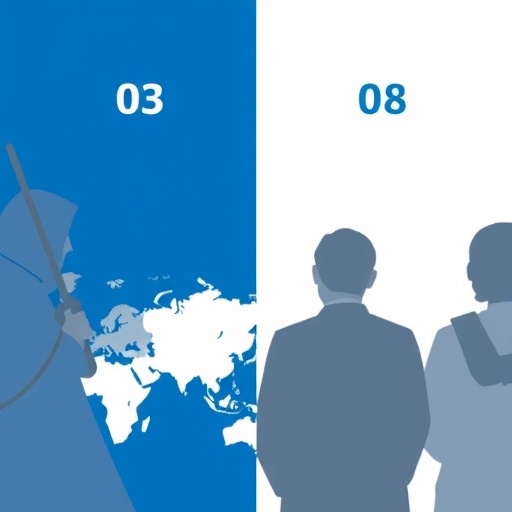In an unprecedented exploration of health disparities, a recent study reveals critical insights into the utilization of mental health and addiction services in New Zealand, focusing particularly on refugees compared to the general population. The study, led by researchers including Malihi, Milne, and Petrović-van der Deen, highlights significant differences and challenges faced by refugees, illuminating the urgent need for tailored mental health interventions. The findings not only shed light on individual experiences but also expose systemic issues that could benefit from meaningful policy adjustments.
Mental health plays an integral role in overall human well-being, but it has often been sidelined in discussions regarding public health, particularly for marginalized populations. Refugees face unique stresses that could exacerbate existing mental health issues, including trauma from their past experiences, challenges in adapting to a new environment, and barriers to accessing appropriate health services. This study aims to dissect these elements and offer actionable insights to improve service accessibility and effectiveness for these vulnerable groups.
A significant aspect covered in the research is the variability in how refugees perceive and access mental health services compared to the broader population. Many refugees may utilize these services less frequently, often due to cultural stigmas surrounding mental health, a lack of awareness about available services, or communication barriers. These nuances are vital in understanding why a considerable portion of the refugee community either underutilizes or misuses available mental health resources.
Analyzing data from various community health organizations, the authors revealed that although refugees constitute a small percentage of New Zealand’s population, their mental health needs are disproportionately high. Factors such as prior trauma severely impact their well-being, leading to increased vulnerability for mental health issues like depression, anxiety, and substance abuse. This situates refugees not merely as a demographic but as a distinct group requiring specialized attention and resources.
Moreover, the research underscores the necessity of culturally competent care. It becomes crucial for healthcare providers to recognize and adapt their approaches to meet the diverse needs of refugee populations. This may involve integrating cultural sensitivity training in mental health practices, ensuring that professionals are ready to engage effectively with patients from different backgrounds. Only then can interventions be relevant and effective.
The study also highlights structural barriers faced by refugees, including restricted access to necessary documentation, healthcare financing, and language barriers that complicate communication with mental health professionals. These hurdles serve to isolate refugees further, intensifying their vulnerabilities and decreasing their likelihood of seeking help. Addressing these systemic issues forms a crucial part of developing a responsive mental health system that meets all citizens’ needs, regardless of their origin.
Innovative solutions are proposed within the study for bridging these gaps. Some suggestions include the development of outreach programs tailored specifically for refugees that provide information about mental health services in accessible formats. Fostering community relationships can also amplify awareness and can help normalize the seeking of mental health services among refugees, thereby encouraging greater uptake.
Moreover, technology’s role in improving access to care cannot be overlooked. Telehealth options have been particularly beneficial during the global COVID-19 pandemic, providing new avenues for refugees to seek help without the anxiety of in-person visits. Flexibility in how and where services are provided could ultimately serve as a game-changer, especially for individuals wary of traditional healthcare settings due to past negative experiences.
The comparisons drawn between the refugee and general populations in the study encapsulate a broader narrative about mental health access and equity. While the general population may have a wider reach to mental health initiatives, enhancing the engagement of refugees in such programs could significantly reduce the mental health care gap. This calls for a concerted effort from governmental and non-governmental entities alike to rethink current service delivery models.
By prioritizing research such as this that intricately details the realities faced by refugees, New Zealand can take proactive steps toward establishing a more inclusive and effective mental health framework. The ultimate goal is not just to make services available but to ensure they are utilized efficiently by all members of society, particularly those facing multiple layers of disadvantage.
As the public health landscape continues to evolve, the findings from Malihi et al. serve as a potent reminder of the necessity for continuous evaluation of service utilization. By integrating feedback from refugees and investing in studies like these, New Zealand can make meaningful strides toward equitable health service access.
Ultimately, the implications of this research extend beyond New Zealand. Countries with similar challenges in accommodating refugees can learn from these insights to enhance their mental health systems. The call to action is clear: the time has come to re-envision mental health services for refugees, ensuring every individual has the opportunity to heal and thrive, contributing meaningfully to society.
The narrative crafted by the researchers paints a vivid picture of resilience amid turmoil, underscoring the strength of the human spirit while calling on institutions to rise to the occasion in support of those seeking refuge. In a world where the stories of refugees are often overshadowed by political discourse, this study shines a light on their mental health needs, reminding us that everyone deserves compassion, understanding, and adequate care.
Subject of Research: Utilisation of specialist mental health and addiction services in New Zealand among refugees compared to the general population.
Article Title: Utilisation of specialist mental health and addiction services in New Zealand: a comparative analysis of refugees with the general population.
Article References:
Malihi, A.Z., Milne, B., Petrović-van der Deen , F. et al. Utilisation of specialist mental health and addiction services in New Zealand: a comparative analysis of refugees with the general population.
BMC Health Serv Res 25, 1308 (2025). https://doi.org/10.1186/s12913-025-13151-4
Image Credits: AI Generated
DOI: 10.1186/s12913-025-13151-4
Keywords: mental health, refugees, addiction services, New Zealand, health disparities, culturally competent care




